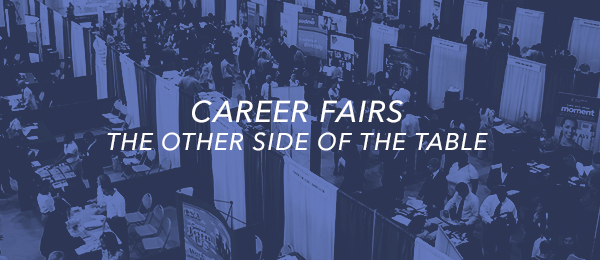In this blog post, two newer members of the M&S team reflect on career fair experiences.
While students, we’d been through career fairs quite a few times. Trying to sell yourself to companies in just a few short minutes is stressful. It can be hard to put yourself out there as an inexperienced student. This year, we got to be on the other side of the career fair table. With the experience of participating in career fairs fresh in our minds still, we have some pointers for students that we think will help them…and us.
What Actually Matters
- Attending career fairs – Despite the feelings of rejection, attending career fairs when I knew there was a small chance of gaining employment, was a seminal decision for me. The experience of imbuing strangers with positive emotions for you is an invaluable life skill, both professionally and personally. Practice this.
- Researching the company’s client base and culture ahead of time – While some technology related companies’ websites may lack details about their day to day operations, search for the company blog or the blogs of their co-founders/employees.
- Showing passion and interest through speech and body language.
- Being able to state one’s objectives, interests and passions – This isn’t always easy when young, but at the least have a short list of professional interests (technologies, areas of industry).
- Demonstrating a genuine, likable personality – Most have heard the phrase a job isn’t just about what you do, it’s about who you do it with. Make sure to be someone that people would want to work with.
What I Worried About Needlessly
- Including every detail on my resume or the location of my GPA on my resume – Yes, your resume is important, but chances are, the person you are talking to is reading your body language and not simply your written language.
- Landing an internship freshman year – I was very frustrated after my first few college career fairs, but if you don’t land an internship until after sophomore year like I did, that is just fine. Keep a positive attitude and ask those in the industry what applicable technologies to study that summer in addition to whatever summer job you land. In next year’s career fair, even your work over the summer in an unrelated field will be interesting for us to hear about.
Some basic Do’s and Don’ts while visiting career fairs.
-
DON’T say, “So… uhh… What do you guys do?” Instead, say something like, “Could you tell me about a project your company delivered?” Even if you didn’t get a chance to research (but you should have) you can get similar information and seem a bit more knowledgeable.
-
DO be able to talk about something you are genuinely passionate about. We notice those subtle, involuntary smiles that happen when its something you truly care about.
-
DON’T be chewing gum. Its not the worst thing you could do, but it is distracting. And really, its not that hard to toss the gum on your way in.
-
DO be prepared to talk about something you’ve worked on. Not everyone will ask you do go into detail about your past experiences, but when you can comfortably talk about your work, you look like you know what you are talking about. And on that subject, don’t go into great detail about the technicality of said project. You have no idea who you are talking to and what kind of background they have, so start first with generic information. Chances are, they are more interested in knowing how you solved the problem — and how you felt while solving it — than what the problem actually is. If they start asking questions about the specifics, then talk the techno-babble.
- DON’T travel with a friend. When you are trying to sell your self as an employee, being independent is a good thing. It also makes it a little harder on us trying to figure out who is actually talking to us. If you do have a friend by your side, be sure to approach different people, or at least separate yourselves enough to give us a chance to talk to you both one on one.
These bits of advice might not guarantee a job, but they will help you become a better interviewee, and becoming a better interviewee will put you at least one step closer to getting a great job.
